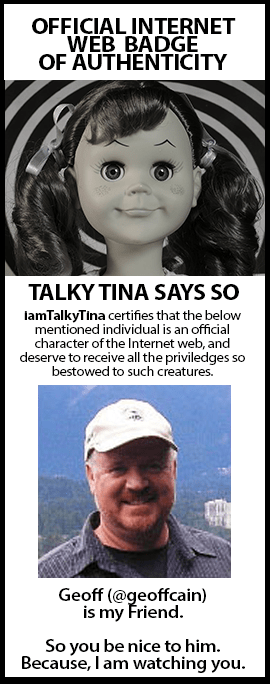Facebook was not the first alarm that ever went off for me around corporate involvement with technology, and I know that I am not alone in that. We all pretty much guessed that it was a compromise. It is no surprise that they sell information. What most people are shocked at is not that their data is being commodified but how little control Facebook has over that data. I know a number of educators who use Facebook, mobile apps, Google Docs (Google everything) with little consideration for the consequences of placing that trust outside of the institution. As educators, we should constantly be asking corporations for more accountability. There are a number of honest corporations out there (I am sometimes wrongly accused of being “anti-corporate”), but part of the problem with corporations is that there may be great intentions by the founders, but when some small, personal operation with integrity gets a huge offer from Megacorp, that integrity does not transfer with the deal. We need to start thinking about alternatives to the “monetize at any cost.” I am not sure where Facebook goes from here, but I do know that some are leaving and others who remain are asking questions. So what is a post-Facebook world? It may be a world without Facebook. Zuckerberg could sell the whole enterprise off and it could get swallowed up into the maw of some competitor. But the post-Facebook world I am really talking about is the one where everyone now knows that these social media corporations cannot be trusted with our data. They are not interested in doing so, and apparently do not have the means or know-how to do so. We have to take responsibility for this if they won’t. Here are a few of my ideas about what a post-Facebook world will look like.
More Transparent
We need to end the victim-blaming idea that “it was all in the User Agreement.” Expecting the average user to understand the language and the consequences of such agreements is disingenuous at best. I think they are overly long and complicated to hide the fact that you have no real “agreement” or to insure there is no agreement. Tech companies should spell out in plain English exactly what their business model is and what they plan to do with our data. It should be written out, drawn, graphed, and animated – as an education consultant, I would be happy to show you how this is done. It needs to be a lot easier to find out how one’s data is being used, and how to protect one’s self.
More Regulated
We need the same kind of regulations that protect health records (HIPAA) and education records (FERPA). This not an anti-business screed. It just makes sense that when so much is at stake (fake news, elections, etc.). Regulating data has not hurt the insurance companies any. I am glad that congress is asking Zuckerberg to testify. He should account for how our data managed to wind up at Cambridge Analytica, and how others have used his platform to manipulate the public politically. But we need to go further, maybe it is time to create an organization or government agency that develops protections for the public against abuses of data.
More Educated
Just as financial literacy is rightly consider at some institutions to be a critical skill, so should digital literacy. Students need to know how to set up a domain, get the tools they need (blogs, wikis, email, etc.), and control their own data. It takes time but no more time than it would take a student to learn how to use a learning management system, school email, or Microsoft 365. And while we are training students and teachers in digital literacy, we should also ask that “entrepreneurs,” business majors, tech investors etc. get some kind of basic ethical training. We teach medical ethics and even beside manners at some medical schools, why shouldn’t there be mandatory ethics classes for business folks? Our education specializations have really hurt us. Middlesex University could not have picked a worse time to close a philosophy department.
More Open
There are open source alternatives to Facebook, especially for educators. For instance one can get WordPress up and running fairly quickly. For many of my folks in the edtech world, the corporate solutions have time and time again failed. And not all domain services are equal: in education a good alternative model would be Reclaim Hosting* (or Rockaway Hosting outside of education) combined with WordPress, Known, or any other open source content management system. Then, it is only a matter of setting up a page that will allow you to follow other folks blogs or RSS feeds. This is not that hard. I was an English major and I eventually, reluctantly, figure this out. With advances in technology, it has only gotten easier. Whether it is the LMS, Open Education Resources, or Open Textbooks, the corporate model always defaults to “how do we make this sustainable” (i.e. how do we make money off of this). Again, this is not an anti-corporation attack, but we need to acknowledge that there are things that corporations do well, and things they have no business in. I am not ready to buy an open source, one-of-a-kind car, or take roll-your-own antibiotics. Our health care, education, and our relationships should not be managed by for profit entities, and neither should our data.
In the meantime:
Write a Letter
The original social networks were created by writing and the invention of the post. The day after I locked down my Facebook account, I wrote a card to my dear father, and it felt great. I have gathered snail mail addresses and am going to write folks more. Some of my friends on Facebook are actually posting their addresses and phone numbers to reconnect with people in the non-digital realm.
Take Someone to Lunch
Seriously, we all need to get out more.
AND, if you have some ideas or models of what a post-Facebook world should look like, feel free to comment below. I would love to hear from you – maybe we can have lunch sometime.
*I will readily admit that I am a huge fan of Reclaim Hosting and the people I know there. This blog is hosted there, but I have no financial interest in their company besides being a customer, and my sincere wishes for their continued success.
Related articles
- Facebook alternatives for keeping in touch with friends (imore.com)
- Securing Healthcare Data and Applications (imperva.com)
- ‘The Business of War’: Google employees protest work for the Pentagon (nationalpost.com)
- Facebook’s Plan To Fight Election Interference Includes Weeding Out Fake Memes and Videos (gizmodo.co.uk)
- Regulation could protect Facebook, not punish it (techcrunch.com)






Being accused of “anti-corporate” isn’t something that should bother you – it’s rational and defensible. The only “good” corporations (from a customer perspective) out there are either very young or failing. The “successful” ones, from a market perspective, are the ones who are wining the race to the ethical bottom… I’ve written up some thoughts on it: https://davelane.nz/megacorps